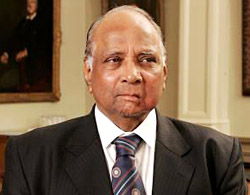A sweet deal in Kolhapur
 “Earlier, the purchase price for sugarcane used to be decided in Baramati (NCP Chief Sharad Pawar’s hometown). Now, it is decided here in Kolhapur,” Raju Shetti says, as he gestures to a crowd waiting for him at Chande village, about 430 km south of Mumbai.
“Earlier, the purchase price for sugarcane used to be decided in Baramati (NCP Chief Sharad Pawar’s hometown). Now, it is decided here in Kolhapur,” Raju Shetti says, as he gestures to a crowd waiting for him at Chande village, about 430 km south of Mumbai.
What Shetti (42), a mechanical engineer who turned to farming and ended up being a peasants’ leader, says is an indication of how Swabhimani Shetkari Sanghatana, a farmers’ organisation, has forced the powerful sugar barons to accept the demands of sugarcane growers — the people for whom a network of about 200 cooperative sugar factories has been built in Maharashtra over the last five decades.
“For years, we were at the mercy of those running the sugar factories. They would decide how much would we get for the cane that we sold,” says Bapu Madnaik (65) a farmer from Udgaon in Kolhapur.
Harried sugarcane growers intensified their agitation over prices in 2002 when Shetti floated the Swabhimani Shetkari Sanghatana. As the agitations turned violent, the government gave in and the sugarcane price was increased to Rs 750 from Rs 550 a tonne.
This year, Sanghatana managed to get the price hiked to Rs 1,600 per tonne. “We changed the system. It is not easy for sugar lobby to dictate terms to us now,” says Shetti.
This goes against the tradition in western Maharashtra — India’s sugar bowl — where the sugar barons, most owing allegiance to the Congress and NCP, rule the roost.
They control the economy and wield political clout.
Shetti’s outfit came under the spotlight after the 2004 Assembly polls, when he won from Shirol constituency from Kolhapur. But a greater shock came in the Lok Sabha elections five months ago: Shetti defeated NCP’s two-time MP Nivedita Mane in the Hatkanangale constituency, a huge embarrassment to the NCP as well as a setback for the sugar lobby.
The barons are now trying hard to marginalise the Sanghatana which has put up four candidates in Kolhapur.
In his campaign meetings, Shetti focuses on the injustice to farmers.
“How much do you get as producers of sugarcane? You get a maximum of Rs 1600 per tonne. The factory earns about Rs 5,500. Where does all this money go?” he asks.
His support base, the farmers, are now realising what they’ve been missing.
“I saw on the Discovery channel how American farmers use helicopters to spray pesticides on crops. I wonder when our government will think about something like that,” says Raju Madnaik, a sugarcane grower from Shirol.
The Sanghatana’s campaign is being watched with keen interest. If its candidates win, it could mean that the sugar barons are losing their grip.